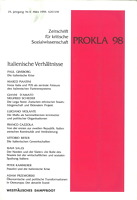Die italienische Krise
DOI:
https://doi.org/10.32387/prokla.v25i98.967Keywords:
Italien, Krise, Staatsverschuldung, Mafia, ÖkonomieAbstract
The article discusses the economic, political and cultural factors which led to the transformation among the parties and in the Italian democracy. The sudden outbreak of the crisis in 1992 is described as a conjunction of external and internal crisis factors. International adjustment constraints, economical missmanagement, the inefficiency of the central govemments, social and political movements in Northern and Southern Italy, as well as the resolute action of judges and public prosecutors against the corrupt political elite, finally made the historical break with the traditional conditions in Italian politics possible. But only in Southem Italy the political caesura was accompanied by social transformations. Finally, this continuity of social conditions explains the rise of Berlusconi.






